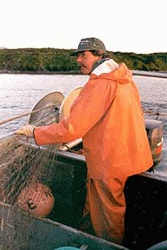| Late at night at our fish camp on Kodiak, in Uganik Bay, after the weekly salmon fishing period had closed, after we had delivered our fish to the cannery tender, we would sit in the cabin, listening to chatter on the VHF radio Channel 7, drinking beer out of the cooler in the creek. From our cabin at East Point we would watch the lights of the Shearwater as she moved around the bay, stopping at each of the other fish camps along the far shoreline to get their fish, and we would listen to the skipper on board calling ahead on the radio to let the other camps know he was headed their way. On closure nights the tender would make its rounds, and then disappear around Broken Point with its load of fish for the run down the coast to the cannery at Larsen Bay, the glow of its decklights hanging in the mist around the corner of the point for a few minutes after the boat made the turn.
And as the long twilights of June and July dwindled into the truly dark nights of mid-August, we would look out across the three miles of water at the lights of the cabins on the other side of the bay, the lanterns of our neighbors the only human light in the world beyond the kitchen where we sat, tiny yellow points of light a mile or two apart at the foot of the mountains on Uganik Island, the white spray of stars above the black ridge.
 |
| Toby Sullivan fishing |
 |
There were about a dozen other camps scattered within VHF radio range on both sides of the bay, and though communication between us was mostly limited to the business of fishing during the fishing periods, on closure nights a certain camaraderie came out on the airwaves. People would chat and banter back and forth across the water in the dark, and as the transmission keys were held down on the mikes you could hear the sounds of the other people in the cabins talking behind the speakers, children laughing, up past their bedtimes, the clink of silverware and dishes as late meals were eaten, the sound of bottles touched to the rims of glasses.
One night in the summer of 1996, after the initial burst of the radio conversation had died down, I sat with my two crewmembers nibbling cold pieces of the salmon we had barbequed for dinner, sipping our beers, listening to the low surf of the rising tide moving up the beach at the bottom of the stairs in front of the cabin. There were longer and longer silences between exchanges on the radio, but we could see the lights of the cabins across the bay, and there was an almost palpable presence of wide awake people listening to the silence of their radios as they sat warm and dry in their cabins, the glow of Coleman lanterns and candles lighting the glasses on their tables.
I had gotten in the habit of reading poetry out of a couple collections to my children that summer, besides the usual bedtime stories. Robert Frost, William Butler Yeats, William Blake, and Robert Service, they loved the cadences of the rhythmic language, and even learned to chant Tiger, Tiger, Burning Bright, in the forests of the night as I read aloud from a book. I had read them a bedtime story and a couple poems earlier in the evening, and then packed them off to their bunks. But now, an hour after midnight, with the radio gone mostly silent, one of my crewmen, a high school kid, brought down the Robert Service off the shelf, and began reading "The Cremation of Sam McGee" to a buddy of his at a fish camp out at Miner's Point. He read it, holding the mike in one hand and the book in the other, and when he was done there were immediate calls from the other camps in the bay to "read another one!"
We took turns reading for a couple hours after that, "The Road Not Taken," and Yeats' "Host of the Air," and even a long passage from Michael Herr's "Dispatches" about the look and feel of battle at night in Viet Nam in 1968. We would pause for long minutes between readings, and at first there were only calls for more, but after awhile when we stopped other voices in other cabins came out of the darkness, reading poems from books they had pulled down off their own fishcamp bookshelves. People began reading amazing things -- poems, passages from novels, lyrics from songs right off the backs of the cassette tape boxes, even the manifesto-like statement of quality from a case of beer. Finally we went to bed. But as I lay in my bunk in the back of the cabin there were still voices out there in the kitchen where the radio was, reading snatches of things, and I fell asleep listening to the voices, the pauses between readings getting longer and longer, the readings slowly fading in frequency over a period of hours, like the diminishing glimpses of a ship as it moves further and further out into the sea and disappears between the waves.
|
 |
|




